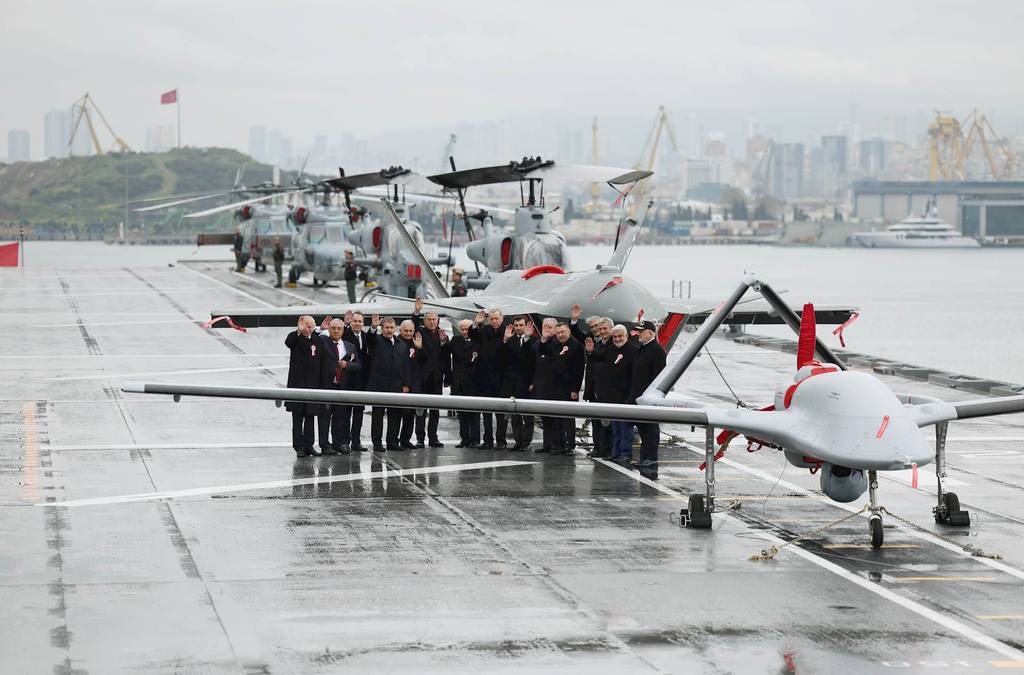
ANKARA — Turkey’s defense-industry ambitions have taken center stage in a polarized campaign here, as 60 million Turks prepare to cast their votes in presidential and parliamentary elections on May 14.
Wary of the country’s worst economic crisis since 2001, the government of incumbent Islamist President Recep Tayyip Erdogan has anchored its campaign on the halo effect of landmark indigenous military programs. Analysts in the camp of Erdogan’s Justice and Development Party (AKP) believe that an association with successful weapons programs may add an extra two to four percentage points to his votes, potentially making the difference in an election that observers agree will end in a very narrow margin.
Regardless of the winner, political analysts here believe chaos may follow, including potential street violence, objections to the vote count and the possibility of a re-run. Most opinion polls suggest Erdogan’s four-party alliance could lose parliamentary majority even if he wins. Erdogan’s bloc faces the opposition candidate Kemal Kilicdaroglu, a social democrat, and his seven-party alliance made up mostly of small parties.
There is data matching up with the Erdogan camp’s hope in local arms manufacturing. Independent polling institute Areda Survey found in a March 27-30 poll that 48.7% of Turks think that a government change would cause a regress in defense programs. Only 38.7% think defense programs would make progress in case of a government change.
Erdogan boasts that Turkey’s local industry now meets 80% of military requirements compared to only 20% when he came to power in 2002. He has accused the opposition bloc of planning to sabotage the nationalization effort of the past two decades.
Erdogan’s election campaign has been based primarily on showcasing national success stories in defense. He has appeared on high-profile ceremonies inaugurating the KAAN, Turkey’s indigenous fighter jet in the making, the Landing Platform Dock TCG Anadolu, the Navy’s biggest ship, the Altay, Turkey’s first indigenous main battle tank, and the Kizilelma, a combat drone. Hundreds of thousands of Turks have visited the 231-meter long TCG Anadolu now being showcased at Turkey’s main ports. On April 24, the Kizilelma made its first autonomous flight.
“This is pure political propaganda,” said one analyst who spoke on condition of anonymity because he fears prosecution. “These systems are works in progress. There will be some time before they become fully operational to enter service.”
Erdogan accuses the opposition of intending to scrap all indigenous programs if Kilicdaroglu came to power. Kilicdaroglu responded: “Why should we? Defense industry is a non-partisan, national issue.”
Defense analyst Murat Yetkin, who publishes the Yetkin Report devoted to Turkish politics, said: “Erdogan is manipulating the criticism by portraying the opposition as a potential killer of the industry. In fact, the criticism is that he has systematically favored (defense) companies close to his circle.”
Ozgur Eksi, head of the defense specialist think tank TurDef, said: “In case of a government change there will be some delays due to a massive bureaucratic reshuffle, but finally it will be business as usual. No political party in Turkey is suicidal enough to kill defense programs.”
Analysts and officials agree that there would be a major reshuffling of the civilian and military bureaucracy if Erdogan lost the presidential seat, starting with the top procurement official, Ismail Demir, head of the country’s influential Defense Industry Agency.
In a video speech, Kilicdaroglu said: “As soon as we come to power, we will make Atatürk Airport the center of aviation and space studies, which will be the dynamo of our aviation and space industry.”
Atatürk Airport, located in the south of Istanbul, was closed to commercial flights after the opening of Istanbul Airport in 2019. Since then, the airport has been open only for maintenance, general aviation, air taxis, business flights and state and diplomatic aircraft.
Kilicdaroglu said that he discussed the project with a leading U.S.-based company, Sierra Nevada Corporation (SNC), owned by a Turkish family.
That led Baykar, maker of Turkey’s best-known drones like the TB-2, to accuse Erdogan’s challenger of working with a U.S. company that “collaborated directly with the CIA.” In response, Kilicdaroglu tweeted: “It doesn’t suit you to be a party’s election propaganda tool. There is room for all our successful Turkish entrepreneurs in the future. Space is wide enough for all of you.”
Kilicdaroglu has pledged to put Turkey back into the Western orbit with a pro-U.S., pro-NATO and pro-EU stance. He has said that Erdogan’s close alliance with Russian President Vladimir Putin will come to an end after the government change.
A senior Turkish military officer, speaking on anonymity for fear of reprisal, said a government change could re-tool major foreign programs. “It would mean a gradual, perhaps slow, return to the major U.S.-made systems, including the F-16 Block 70 and, though now a remote possibility, to the F-35 consortium, depending on the sustainability of any opposition rule,” the officer said. “That will also bring up the question: How do we wisely get rid of the S-400s?”
In 2019 Erdogan’s government decided to buy the Russian-made S-400 ground-to-air missile system under a $2.5 billion contract. In response, Washington kicked Turkey out of the F-35 program. Turkey’s official request for the acquisition of F-16 Block 70 aircraft awaits congressional approval in Washington.
Fearing broader Western sanctions, Erdogan’s government has never disclosed if or where the Turkish military deployed its S-400s. Many insiders believe the S-400s have never been unpacked.
Burak Ege Bekdil is the Turkey correspondent for Defense News.
- SEO Powered Content & PR Distribution. Get Amplified Today.
- PlatoAiStream. Web3 Data Intelligence. Knowledge Amplified. Access Here.
- Minting the Future w Adryenn Ashley. Access Here.
- Buy and Sell Shares in PRE-IPO Companies with PREIPO®. Access Here.
- Source: https://www.defensenews.com/global/europe/2023/05/11/arms-industry-takes-center-stage-in-turkeys-tense-election-campaign/



